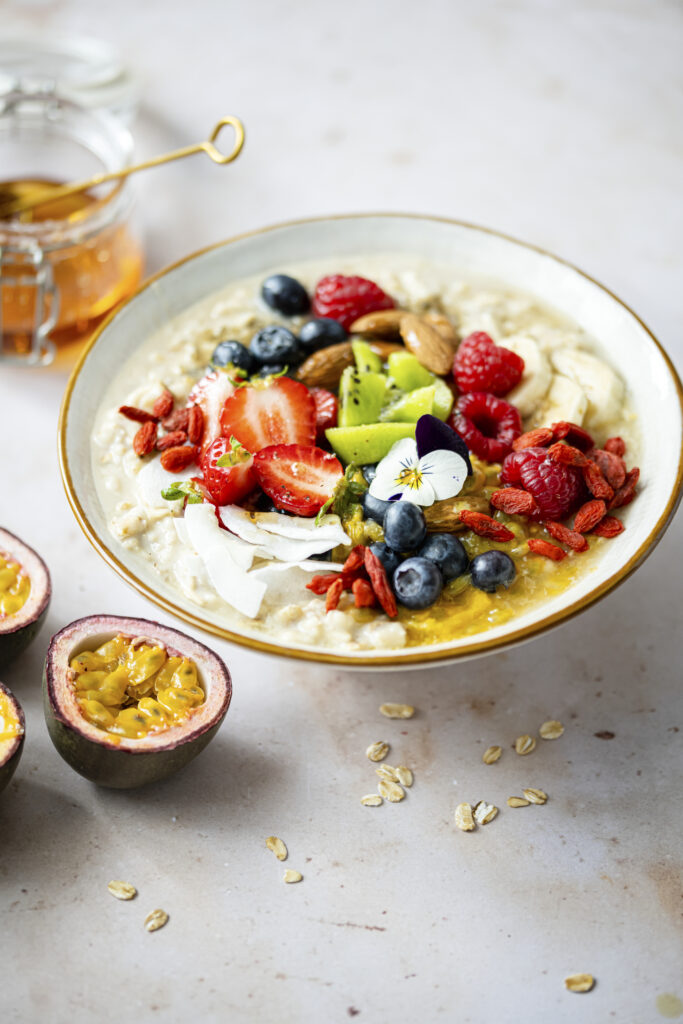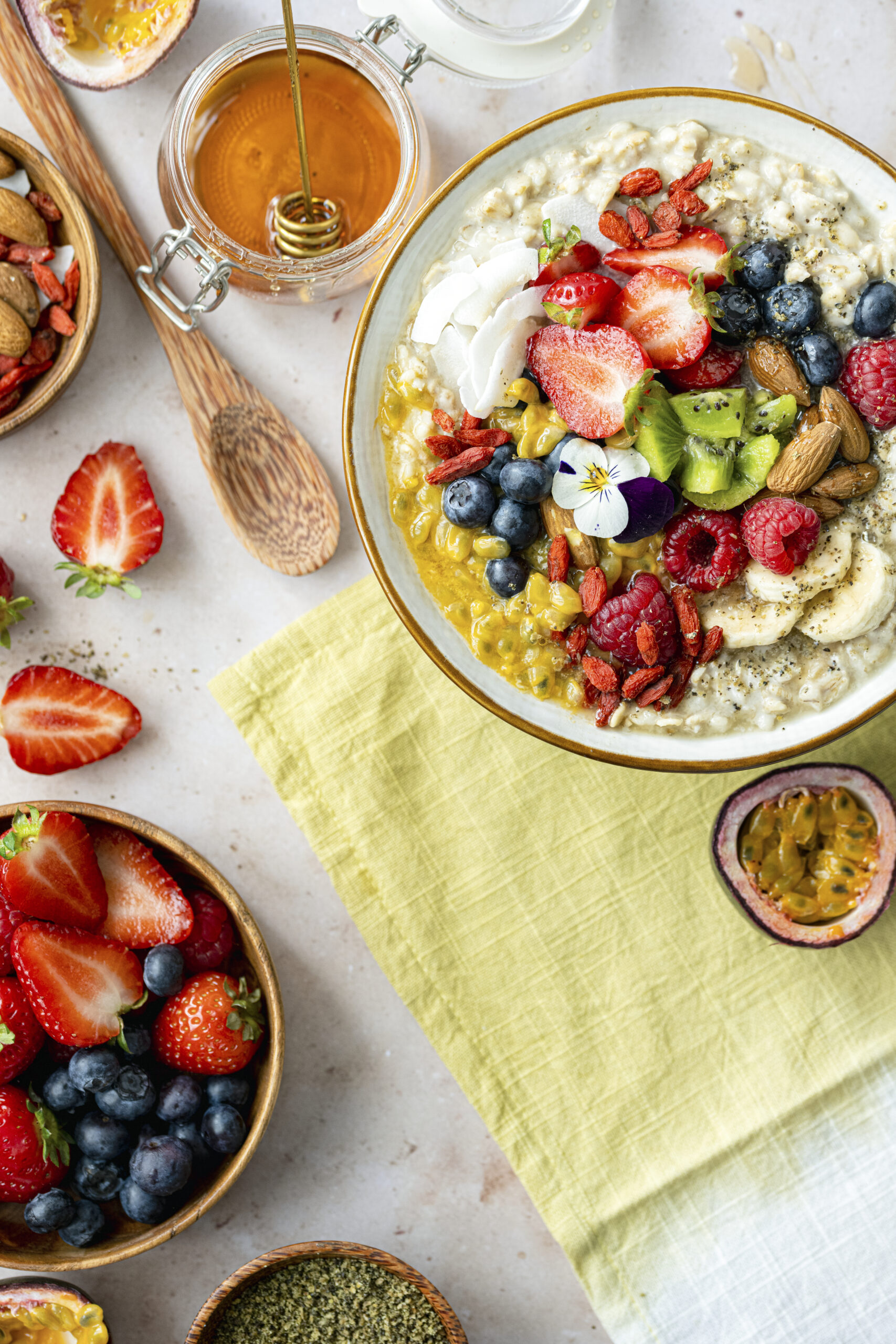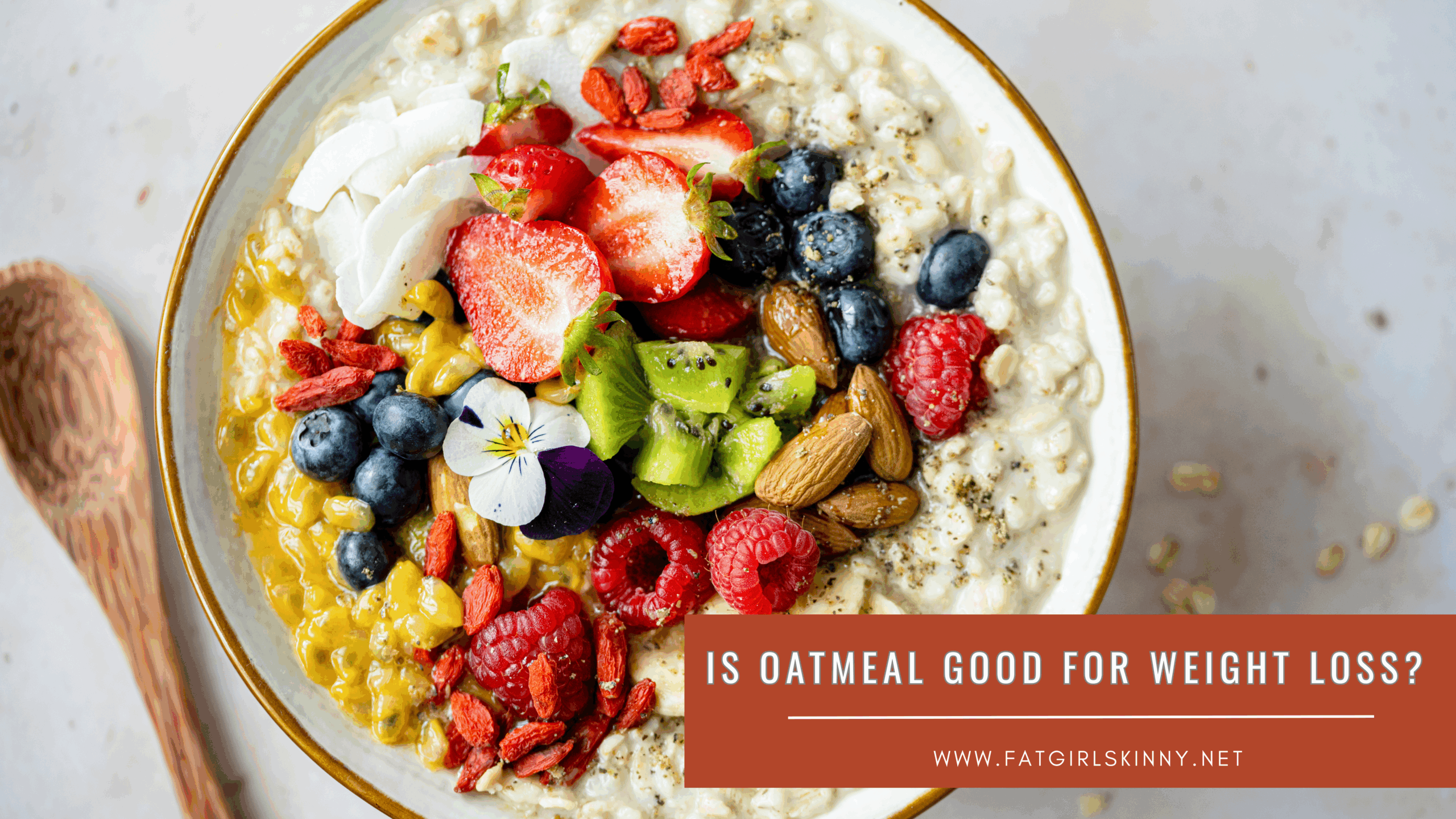Is Oatmeal Good For Weight Loss?
When you’re trying to lose weight, breakfast can feel like a bit of a minefield. Do you skip it altogether to save calories? Grab a cereal bar on the go? Or settle for a boring bowl of something you’re not really excited about?
If you’ve been on Slimming World for a while—or even if you’re just dipping your toes in—you’ve probably heard that oatmeal (or porridge, as us Brits prefer to call it) is a healthy breakfast option. But is it actually good for weight loss? And can something that tastes like warm sludge (sorry, just being honest!) really help you shift the pounds?
Here’s the good news: when it’s done right, oatmeal can be one of the most filling, nourishing, and slimming breakfasts out there. It’s not fancy, flashy or Insta-worthy (unless you put some serious effort in), but it is wholesome, comforting, and brilliantly versatile. The kind of breakfast that warms your belly, keeps you satisfied, and helps you avoid raiding the biscuit tin by 11am.
What Exactly Is Oatmeal?
Let’s start with the basics. Oatmeal, or porridge as most of us in the UK call it, is a warm, comforting dish made from oats—a type of whole grain known for its impressive nutritional benefits. You’ll usually find it served as a hot breakfast, but oats can be used in loads of other ways too, from overnight oats to healthy bakes and even savoury dishes.
Oats come from the Avena sativa plant and have been cultivated for thousands of years. They originated in parts of Europe and Asia and were once considered more of a weed than a crop—hard to believe, considering how many of us rely on them as a breakfast staple now! Scotland, in particular, has a long history with oats. In fact, porridge has been a Scottish tradition for centuries, often stirred with a wooden “spurtle” and served up with just a pinch of salt.
Types of Oats You Might See
There are a few different types of oats you’ll come across on the supermarket shelves:
-
Whole oat groats – These are the least processed form, with the outer husk removed. They’re packed with nutrients but take ages to cook.
-
Steel-cut oats – Also known as pinhead oats, these are chopped whole groats. They have a slightly nutty texture and take a bit longer to cook than rolled oats.
-
Rolled oats – The most common variety in UK supermarkets. These oats are steamed and rolled flat for quicker cooking and are perfect for porridge.
-
Instant oats – These are rolled even thinner and often pre-cooked. They cook quickly but can sometimes be found with added sugars and flavours, so always check the label.
When we talk about “oatmeal” in the context of weight loss, we’re usually referring to plain rolled oats cooked with water or milk, then topped with fruit or other healthy additions. Simple, nourishing, and totally customisable.
Is Oatmeal Good for Weight Loss?
In short—yes, it absolutely can be. But (and there’s always a but), it depends on how you prepare it and what you add to it. On its own, oatmeal is naturally low in calories, high in fibre, and full of slow-releasing energy—all things that can help support a healthy weight loss journey.
Here’s why it works:
It Keeps You Full for Hours
One of the biggest battles with weight loss is hunger—and that’s where oatmeal really shines. Thanks to its high fibre content, particularly beta-glucan, oats digest slowly and keep you feeling fuller for longer. This means fewer mid-morning snack cravings and less reaching for the biscuit tin at 10am!
It Helps Balance Blood Sugar
Oats are low on the glycaemic index (GI), which means they release energy slowly. This helps prevent energy crashes that can lead to overeating, especially if you’re someone who tends to snack when you’re tired or irritable.
It’s Naturally Low in Calories
A basic 40g serving of plain porridge oats made with water or skimmed milk is a low-calorie, nutrient-dense meal. It can easily fit into your daily calorie or Syn allowance without blowing the budget—especially when counted as your Healthy Extra B on Slimming World.
It’s Easy to Portion and Control
Oats are simple to measure and track. A standard 40g portion is your Healthy Extra B, and as long as you keep an eye on what you’re stirring in you’re unlikely to go overboard.

Health Benefits of Oatmeal
We’ve already touched on why oatmeal is great for weight loss—but the benefits go far beyond the scales. Whether you’re following Slimming World, calorie counting, or simply trying to eat more whole foods, oats are a brilliant ingredient to include in your diet.
Here are some of the top health benefits of oatmeal that make it more than just a humble breakfast bowl:
High in Fibre – Especially Beta-Glucan
Oats are rich in soluble fibre, particularly a type called beta-glucan. This special fibre forms a gel-like texture in the gut that helps:
-
Lower bad cholesterol (LDL)
-
Slow digestion
-
Keep blood sugar levels stable
-
Increase feelings of fullness
Beta-glucan has even been linked to improved heart health, and regular intake may help lower your risk of cardiovascular disease.
Good Source of Plant-Based Protein
A standard 40g serving of oats contains around 5g of protein, which helps keep you fuller for longer and supports muscle repair and maintenance—especially important if you’re adding exercise to your weight loss journey.
Supports Heart Health
Thanks to its fibre content and cholesterol-lowering effects, oatmeal is a heart-healthy food. It can help reduce total and LDL cholesterol levels, improve blood pressure, and reduce inflammation—making it a smart choice for anyone watching their heart health.
Helps Regulate Blood Sugar
Oats have a low to moderate glycaemic index, which means they release energy slowly without spiking blood sugar. This makes them ideal for those managing type 2 diabetes or anyone trying to avoid sugar crashes and cravings.
Supports Digestive Health
Let’s talk about gut health! The fibre in oats not only keeps things moving regularly (you know what I mean…), but it also helps feed the friendly bacteria in your gut. A healthy digestive system can lead to better nutrient absorption, reduced bloating, and even a stronger immune system.
May Support Mental Wellbeing
Oats are a complex carbohydrate that help your brain produce serotonin, the feel-good hormone. Eating a steady, balanced breakfast like porridge can help stabilise your mood and improve focus throughout the day—especially useful when you’re trying to stick to plan and avoid emotional eating.
Oatmeal Disadvantages
We’ve sung the praises of oats—and rightly so—but no food is perfect. While oatmeal can be a brilliant part of a healthy, slimming-friendly diet, it’s also important to know where things can go a bit pear-shaped.
Here are a few disadvantages of oatmeal to be aware of—especially if you’re trying to lose weight or stay on plan.
It’s Easy to Overload on Toppings
Let’s be honest—plain porridge can be a bit bland on its own. That’s why so many of us reach for toppings like honey, golden syrup, peanut butter, jam, or even chocolate chips. While these might make your bowl more exciting, they can also send the Syns and calories soaring before you know it.
Even healthy toppings like nuts, seeds, and dried fruit can be calorie-dense, so it’s easy to undo your good intentions if you’re not careful with portion sizes.
Top Tip: Always measure your extras and track your Syns—guesswork can be your downfall!
Portion Control Can Be Tricky
Oats are small but mighty—and they expand a lot when cooked. If you’re not weighing out your portion (especially if you’re using them as your Healthy Extra B), you could be eating far more than you realise. That “little extra handful” could turn into a few hundred extra calories.
It Can Get Boring
Let’s face it—oatmeal isn’t the most thrilling breakfast in the world. If you’re eating it every day, it can start to feel like a chore, and that’s when temptation creeps in. Variety is key to staying on track with Slimming World or any healthy eating plan, so don’t feel you have to force it if it’s not your thing.
Some Instant Oats Are Packed with Sugar
Not all oatmeal is created equal. Pre-flavoured, instant oat sachets (the ones that come in boxes with names like “golden syrup” or “apple and cinnamon”) are often loaded with hidden sugars and artificial flavours. These can be high in Synsand don’t offer the same nutritional value as plain oats.
Always check the label—even the “healthy” ones aren’t always what they seem.
Oats Can Cause Bloating for Some People
Although oats are great for digestion thanks to their fibre content, they can cause bloating or gas in some people—especially if your body isn’t used to a high-fibre diet. If this happens, try introducing them gradually and drink plenty of water to help things along.

What About Overnight Oats?
If you’re not a fan of standing over the hob in the morning or you simply prefer your breakfast grab-and-go style, then overnight oats might just be your new best friend. They’re convenient, customisable, and perfect for busy mornings—plus they’re completely Slimming World–friendly when made correctly.
Overnight oats are exactly what they sound like—uncooked oats soaked overnight in the fridge. Instead of cooking them with heat, you let them absorb liquid (usually yoghurt and milk) to become soft, creamy, and ready to eat by morning. Think of them as cold porridge with a pudding-like texture.
They’re ideal for meal prepping, and you can make a few jars in advance so you’re sorted for the next few days.
Check out my Best Ever Overnight Oats Recipes here
Final Thoughts
Oatmeal is a simple, satisfying and slimming-friendly choice that fits perfectly into a healthy lifestyle. It’s filling, nutritious, and easy to customise—just remember to stick to your portions and watch those toppings!
Whether you enjoy it hot or cold, oats can be a brilliant tool for weight loss when used wisely. Delicious, affordable and versatile—what’s not to love?








Awsome information love reading your posts I’m
In Australia and buy the magazine which has taught me how to follow the program only thing a lot of the products here are not the same as over there which is a bit tricky keep up the great work cheers anna from down under